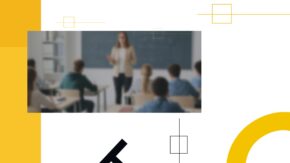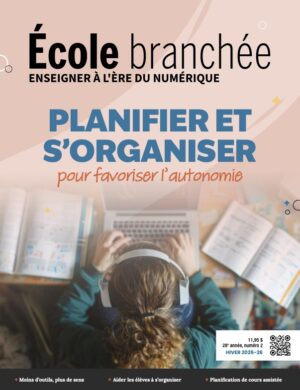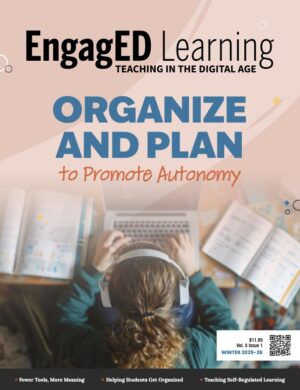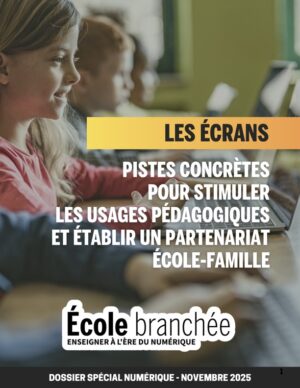Engaged Learning Magazine
5e année, numéro 1. Automne 2025
32 pages couleurs, plus couverts
Cliquez sur une image pour l'agrandir!
In recent years, it’s become increasingly clear that the well-being of students and school staff is key to creating a healthy and supportive learning environment—one that truly fosters educational success. Today, more than ever, this topic has become central to conversations in education, especially as we reflect on how to make digital habits more
intentional and balanced.
That balance is essential for building lasting learning, increasing students’ engagement in class, and cultivating happiness at school—for everyone! So how can schools become a meaningful source of well-being? What practices help reduce the negative impact of screen use on mental and physical health, while making the most of its educational value?
In this issue, we explore a range of initiatives, strategies, and reflections that show how schools are working to align well-being with daily school life in an increasingly connected world. From strengthening social-emotional skills and encouraging responsible digital habits, to managing screen time in healthier ways and creating time for students and staff to recharge, the ideas shared here are grounded in the realities of today’s classrooms. As technology takes up more space in our lives, it’s more important than ever to rethink how we use it in education—with care and purpose. When integrated thoughtfully, digital tools can spark motivation, build autonomy, and support collaboration. But this only happens when they’re part of a broader commitment to well-being—for both students and educators.
This issue invites us to reflect together on what it takes for every member of the school community to thrive. It’s a call to seek balance between digital practices and overall wellness—because a school rooted in health and happiness lays the groundwork for deep, lasting learning.
Happy reading!
Martine Rioux
Editor-in-chief

Schools are complex ecosystems that evolve alongside societal challenges, making well-being a shared responsibility. In this article, discover how Nancy Goyette, full professor, and Coralie Beaumont, master’s student in educational psychology at Université du Québec à Trois-Rivières, examine how the educational psychology of well-being and the PERMA+4 model can address difficult working conditions, support collective mental health, and guide meaningful cultural change in school communities.

In today’s digital age, where online content and cyberbullying can shape and sometimes distort students’ self-perception, self-confidence has never been more important. In this article, France Legault, Academic Advisor and Tutor at TÉLUQ, and Philippe Picard, Education Specialist and Coach at Murmuration-Conseil, present four practical strategies: understanding student behaviour, flexible pedagogy, meaningful feedback and metacognition to foster self-awareness and support well-being in schools.

Staff well-being is a vital strategic lever for boosting motivation, enhancing performance, reducing staff turnover, and fostering innovation. Carole Brouillard-Landry, Leader in Cultural Engagement at Le Centre franco, Johanne Ste-Croix, Director of Pedagogy at Le Centre franco, and Mélanie Courtemanche, Education Consultant, examine practical strategies for creating healthy and supportive work environments, outlining key considerations for enhancing engagement, sustaining performance, and fostering a positive and collaborative organizational culture.

What if emotions were seen not as distractions, but as the foundation for learning? In this article, Nicole Arsenault, from EngagED Learning, examines Dr. Marc Brackett’s insights on emotional intelligence, focusing on stressors in education, empathy, emotional regulation, and equity in emotional expression. She shares approaches to help educators strengthen well-being, enrich relationships, and create more inclusive school cultures.

In classrooms across Quebec, a quiet but profound shift is underway. Starting Fall 2025, the provincial government will implement a bell-to-bell ban on cellphones in all public schools. In this article, Chris Colley, Provincial Pedagogical Consultant at LEARN-RÉCIT, examines the research behind the ban, its expected benefits for wellbeing and learning, concerns from parents, and strategies schools can use to ensure a smooth and effective transition.

Statements like “Kids spend too much time in front of screens” are common. In this article, discover how Josée Gaudet, Mentor in Active and Inclusive Pedagogy at the District scolaire francophone Nord-Est in New Brunswick, encourages students to use technology actively, creatively, and mindfully. She addresses screen time management, digital learning tools, and wellness breaks to support healthy, meaningful use.

8 tips to stay balanced with tech.

With digital technology now embedded in everyday life, schools face the ongoing challenge of balancing its educational benefits with its potential distractions and risks. In this article, Chris Kennedy, Superintendent of the West Vancouver School District, presents Personal Digital Device Best Practice Guidelines to support K–12 classrooms, outlining key principles and approaches to guide purposeful technology use, support student well-being, and promote a positive, inclusive digital culture.

In classrooms today, digital tools are more than just add-ons—they are central to how students learn, connect, and express themselves. Yet questions persist about when screen use supports learning and creativity and when it becomes dependency. This article from EngagED Learning presents research by Si Chen, Omid Ebrahimi, and Cecilia Cheng that examines the intricate connections between emotions, behaviours, and digital habits, emphasizing that the quality of engagement is a key factor in shaping student digital well-being.

With growing parental concerns and the day-to-day realities in schools, the issue of screen use has become impossible to ignore. Given the well-documented negative effects of digital overexposure, how can schools take an active role in fostering more intentional and healthy use of technology? In this article, Laurie Michel, Specialist in Digital Well-Being and Disconnection Support, examines three complementary dimensions of digital well-being and outlines strategies for schools to promote balanced, healthy digital engagement.

The health and well-being of young people have become central concerns in education, particularly following the pandemic’s impact on students’ physical and mental health. In response, École secondaire Eulalie-Durocher launched an elective course titled Health and Well-Being. Amélie Rodrigue, Education Consultant at École Eulalie-Durocher, Centre de services scolaire de Montréal, presents how the course fosters healthy lifestyle habits through physical activity, well-being strategies, nutrition education, and supportive learning environments.

Technology is advancing rapidly. In just over 30 years, the world has witnessed the birth of the internet, the advent of social media, the proliferation of smartphones, the introduction of self-driving cars, and the mainstream adoption of generative artificial intelligence, often accompanied by bold promises of improving lives. In this article, Kathleen Lane, Executive Director of the EdCan Network, examines how emerging technologies affect educator well-being and professional efficacy.

A topic that has been at the forefront of education and public health discussions for several years is the measurable impact of smartphone use on the well-being of children and adolescents. Should smartphones be viewed as harmful devices to be avoided, or can they also offer meaningful benefits for youth well-being? In this article, Charles Bourgeois, Ph.D., Lecturer at Université de Sherbrooke and Vice-President of the Centre pour l’intelligence émotionnelle en ligne, examines the potential and limits of school-wide smartphone bans, highlighting research on mental health, attention, and equity, and considering inclusive, reflective approaches to fostering student well-being.

Each issue of the magazine features a selection of resources to discover. In this edition, the focus is on digital tools designed to support well-being and promote personal growth in the school setting.

Global experts, including the World Health Organization and International Labour Organization, recognize that workplace well-being is a shared responsibility among employees, employers, and unions or associations. In this article, discover how authentic employee input, union collaboration, and systemic strategies can strengthen healthy, supportive workplaces by addressing the issues affecting well-being through individual, collaborative, and systemic actions.
This article contains all the references of EngagED Learning Magazine, Volume 5 issue 1, Fall 2025.
Publicité
ecolebranchee.com/devenez-annonceur

La revue École branchée s’adresse au personnel enseignant, conseiller(ère)s pédagogiques et directions d’établissements. Elle paraît en format imprimé et numérique. On peut s’y abonner personnellement ou choisir une avantageuse licence institutionnelle.




Pour vous offrir une expérience optimale, nous utilisons certaines technologies — dont les témoins (cookies) — afin de stocker et/ou d’accéder à des informations liées à votre utilisation du site. Votre consentement nous aide à mieux comprendre votre parcours de navigation et à améliorer nos contenus et services. Le refus ou le retrait de votre consentement pourrait toutefois limiter le fonctionnement de certaines fonctionnalités.